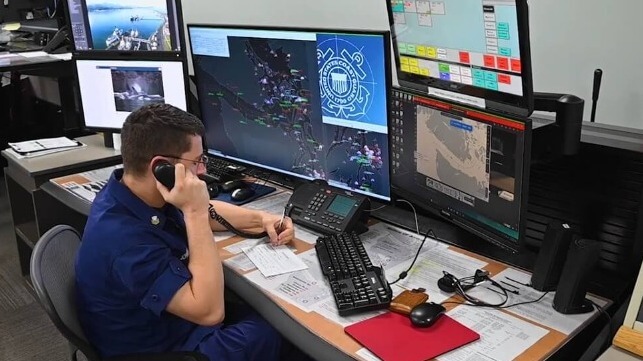U.S. Coast Guard Integrates Whale Tracking Into Seattle VTS Center

The U.S. Coast Guard's Seattle base will soon be collecting and distributing reports on whale movements to help ships avoid hitting cetaceans, in real time.
Thanks to an extra set-aside of funding in the FY2022 funding bill, Sector Puget Sound is setting up a "cetacean desk" in its Vessel Traffic System operations center, where Coast Guard personnel help manage collision avoidance for marine traffic between Olympia and the Strait of Juan de Fuca. The new desk will collect reports of whale sightings from mariners in the area, and will distribute up-to-date information about whale locations through a special-purpose Whale Report Alert System. The Canadian Coast Guard already operates a similar system for its waters to the north.
"The more data we have coming in, the better we can inform ships of where whales are around them," says Lt. Cmdr. Margaret Woodbridge, the desk's program manager. "This data is also shared with scientists in the region who are studying whales."
The desk is also a success for the Quiet Sound program, a partnership led by the state blue-tech accelerator Washington Maritime Blue. Quiet Sound is an attempt to reduce ship impacts on Southern Resident Killer Whales, an endangered subpopulation of orcas that live full-time in the Salish Sea and only eat salmon. Preservation of this unique 74-whale population is a top priority for conservationists, marine biologists and maritime regulators in the region. Vessel noise reduction (through speed reduction) is the leading objective, followed by ship-strike avoidance.
In October through January, Quiet Sound organizes a voluntary slowdown initiative aimed at reducing harm on migrating orcas in the Puget Sound. The first round was held last year, and vessel slowdowns reduced underwater noise by about half, according to the group.
“The new cetacean desk aligns with our regional goals to help endangered whales and ships share the waters of the Salish Sea,” said Rachel Aronson, the Quiet Sound program director at Washington Maritime Blue. “When mariners call in a sighting to the VTS, that sighting will be used to help other mariners make safer choices."
